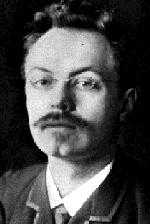Alphons Diepenbrock

Alphonsus Johannes Maria Diepenbrock (2 September 1862 in Amsterdam – 5 April 1921) was a Dutch composer, essayist and classicist.
Life and work
Diepenbrock was not a musician by training. Brought up in a prosperous Catholic family, although he showed musical ability as a child, the expectation was that he would enter a university rather than a conservatory. And so he studied classics at the University of Amsterdam, gaining his doctorate cum laude in 1888 with a dissertation in Latin on the life of Seneca. The same year he became a teacher, a job which he held until 1894, and his decision to devote himself to music. As a composer, he had been completely self-taught from an early age.
He created a musical idiom which, in a highly personal manner, combined 16th-century polyphony with Wagnerian chromaticism, to which in later years was added the impressionistic refinement that he encountered in Debussy's music.
His predominantly vocal output is distinguished by the high quality of the texts used. Apart from the Ancient Greek dramatists and Latin liturgy, he was inspired by, among others, Goethe, Novalis, Vondel, Brentano, Hölderlin, Heine, Nietzsche, Baudelaire and Verlaine.
As a conductor, he performed many contemporary works, including Gustav Mahler's Fourth Symphony (at the Concertgebouw) as well as works by Fauré and Debussy.
Throughout his life, Diepenbrock continued his interests in the wider cultural sphere, remaining a classics tutor and publishing works on literature, painting, politics, philosophy and religion. Indeed during his lifetime his musical skills were often overlooked. Nonetheless, Diepenbrock was very much a respected figure within musical circles. He counted amongst his friends Mahler, Richard Strauss and Arnold Schoenberg.
Alphons Diepenbrock is related to Cardinal Melchior von Diepenbrock, who was his great uncle, as well as to a branch of the family that immigrated to America in 1879.
Works
- Missa in die festo 1891,
- Te Deum 1897,
- Ik ben in eenzaamheid niet meer alleen 1898,
- Hymne an die Nacht 1899,
- Vondels vaart naar Agrippine 1903,
- Im Grossen Schweigen 1906,
- Die Nacht 1911,
- Marsyas 1910,
- Gijsbreght van Aemstel 1912,
- De Vogels 1917,
- Elektra 1920
References
- (Dutch) Biography
External links
| Wikimedia Commons has media related to Alphons Diepenbrock. |
- Free scores by Alphons Diepenbrock at the International Music Score Library Project
- Alphons Diepenbrock Oeuvrecatalogus - online database of all compositions by Alphons Diepenbrock
|